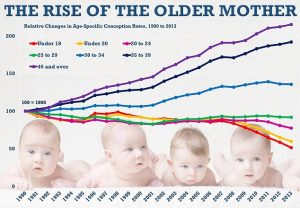More than 26% of babies are now born by Caesarean Section. Potentially impacting on a woman’s plans for her return to work.
Spokesman for the Royal College of Obstetricians and Gynaecologists (RCOG), Dr Patrick O’Brien, says. ‘The growing trend of women delaying becoming a mother until their late thirties or early forties is, we believe, an inevitable one. Because of the increasing equality in the social, professional, financial and corporate environment that we live in”. The RCOG warn that ‘it is increasingly difficult to fall pregnant, and the chance of miscarriage rises’.
Employers have a responsibility to undertake risk assessments of pregnant workers. Evidence would suggest that where an older worker is pregnant, a risk assessment needs to be especially thorough. Also pay heed to advice from midwife / GP. Keeping this risk assessment under review throughout the pregnancy is sound advice.
Some employers still make unfounded assumptions about a mother’s commitment to her work. The Commons Women and Equalities Committee created a recent report. It claimed that the number of women were forced to leave their jobs. Usually, because of pregnancy discrimination, or concerns about the safety of their child. Apparently, this figure has doubled over the past decade to a shocking 54,000. There is no evidence that a pregnant woman or new mother is going to take more time off work. Just as mothers in the workplace are becoming older, so are fathers. When did an employer last question an older father’s commitment to his work or force him to leave his job because of the impending birth of his child?
What do you do if you have an older worker who has become pregnant?
- undertake a risk assessment, and keep it under review.
- ensure that you allow the employee time off to attend ante-natal appointments.
- discuss thoroughly any requests for flexible working so that you understand what you are being asked to consider.
- ensure that you maintain absence recording, but, if the employee’s absence levels increase during her pregnancy take care in how you handle this.
- maintain dialogue with the pregnant worker to ensure that she understands the importance of alerting you to any changes in her health or advice that she has received.
- give yourself enough time to adequately prepare to cover the pregnant employee when she starts her maternity leave. Do not leave this too late. No-one wants circumstances to change which mean that the woman has to cease work early for either her health or that of her baby, but sometimes this can happen. If you don’t have plans in place early enough this can be an extremely difficult scenario to manage.
If you want to discuss pregnancy or maternity leave in the workplace, give us a call – 01706 565332 Or email us here.
Metis HR is a professional HR Consultancy based in the North West of England supporting clients across the country. We specialise in providing outsourced HR services to small and medium-sized businesses. Call us now on 01706 565332 to discuss how we may help you.


